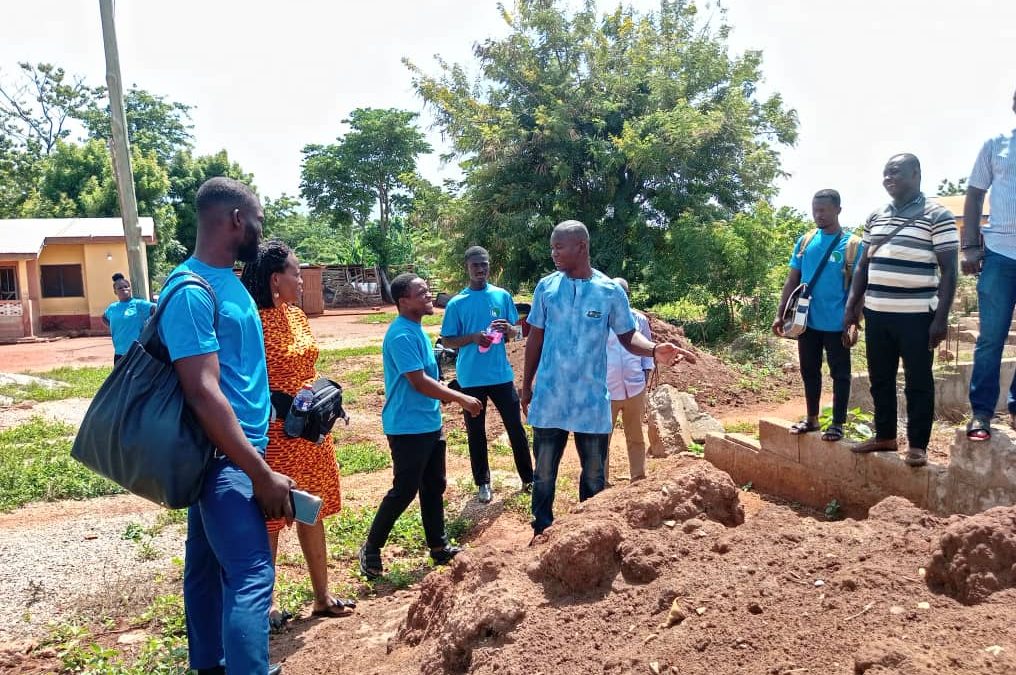Story by So Abapa Boateng, Nkoranza
It was yet another grueling and enduring moment for Community-Based Facilitators (CBFs) from ten partner communities in the Nkoranza South Municipality of the Bono East Region of Ghana. These CBFs, together with selected members of staff of the Nkoranza South Municipal Assembly, gathered once again in Nkoranza to deepen their understanding of the Facilitated Collective Action Process (FCAP), which aims at strengthening local participation in the implementation of the assembly’s medium term development plan.
One of the key highlights of the meeting was field practicing proposal development, which primarily provides an opportunity for the CBFs and the local government staff to interact with community members on the practicalities involved in community meetings in relation to the smooth implementation of FCAP.
The field practicing proposal development phase provides an opportunity for a community to delve deeper into the choice of its development pathway and how it will aid in the fulfilment of the community’s development vision in line with the local assembly’s medium-term plan.
The CBFs literally put into practice the activities learnt during the proposal development process. As part of the field practice, a topic from the proposal development sub-phase is selected for a facilitator to plan and come up with a meeting guide to facilitate it at a community meeting.
As part of the field practicing proposal development, the CBFs visit selected project sites identified by the communities for their development pathways. This provides yet another opportunity for community leaders to delve deeper into the choice of the pathway and how it will aid in the fulfilment of their community development vision.
The core objective is to equip the CBFs and the assembly staff with practical experience during the proposal development sub-phase. The CBFs plan their meetings by outlining the topics to be discussed, the facilitation techniques to be used and go further to figure out possible challenges that might come their way and how they will be addressed.
The Director for Community-Driven Development (CDD) programs of ACA, Nana Ama Nketia-Quaidoo (Mrs), noted in an interview, that such an activity offers ACA the opportunity to assess the level of understanding of the CBFs on the various topics treated during the training sessions and how they will put the knowledge acquired into practice.
“The assessment is done on their level of preparedness before the meeting, their understanding of the topic, the techniques used during the facilitation and how well they engaged the communities during the community meeting. It enables the trainers to identify areas that need improvement during the facilitation and promptly work with the facilitator to identify ways of improving upon it before the actual proposal development meeting in the communities start.”
“It also builds the confidence of the CBFs in facilitating the various steps of the proposal development sub-phase and enables the assembly staff supervise them appropriately and further details the role of the technical advisor during the proposal development sub phase, which is guiding the communities to strategically tailor their implementation action plan and budget to their desired projects or development pathways.
Bonsu and Nkwabeng hosted the team for the field practice, which was generally very successful. The team visited the Nkwabeng community development site where a proposed Out-Patients Department (OPD) is to be built under FCAP.
At Bonsu, the visit took the team to the Bonsu water site to get firsthand knowledge on their proposition for an extension of water to their households.
The ten communities which participated in the training programme were Akuma, Akumsa Domase, Abuontem, Asuano, Barnufour, Brahoho, Bredi No. 1, Bonsu, Nkwabeng and Kyekyewere.
Advocates for Community Alternatives (ACA), a non-profit-making organisation, which helps West African communities that are threatened by the destructive impacts of extractive projects to take control of their futures, is partnering with the Nkoranza South Municipal Assembly to roll out FCAP, which is also called “Oman yie die” in Ghana, in these ten communities in the area.
Community meetings are expected to be facilitated for two months by the CBF under the supervision of an ACA trainer and the Nkoranza South Municipal assembly staff.
(Note: The writer is a CDD Trainer based in Nkoranza in the Bono East region of Ghana)

Recent Comments